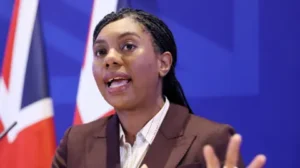**Kogan Appointed Chair of New Football Regulator: A New Era for English Football Governance**
In a significant development for English football, David Kogan, a prominent sports media rights executive, has been appointed as the government’s preferred choice for the chair of the proposed independent football regulator. This new regulatory body is set to oversee the governance of professional men’s football in England, marking a transformative change in how the sport is managed and monitored.
The announcement came from Lisa Nandy, the Secretary of State for Culture, Media and Sport, who asserted that Kogan was selected due to being the “outstanding candidate” for this crucial role. Nandy emphasized the importance of light-touch regulation and the necessity to put fans back at the heart of the game. She expressed confidence in Kogan’s ability to ensure financial sustainability for clubs while enhancing the experience for supporters.
Kogan is preparing to face examination from Members of Parliament on the Culture, Media and Sport committee for what is termed “pre-appointment scrutiny.” He must demonstrate his vision and readiness to collaborate with clubs and fans to create a “dynamic framework” that secures the future of English football. Kogan expressed his commitment to working alongside clubs, regardless of size, recognizing their role in contributing to local pride, economic growth, and community unity.
The Football Governance Bill is currently under deliberation in Parliament and aims to establish the independent regulator—an initiative reintroduced by the Labour government last October. This legislation will empower the new body to oversee clubs within the upper echelons of English football, specifically the top five divisions. Kogan anticipates that his work will involve addressing pressing issues such as the contentious parachute payments afforded to relegated clubs and instigating a more equitable financial redistribution across the leagues.
Bringing a wealth of experience to the role, Kogan has a history as a former BBC journalist and as a director for the Women’s Sports Group. Notably, he played a pivotal role in brokering media rights deals for the Women’s Super League and Women’s Championship last year, showcasing his expertise in navigating the complexities of sports media rights and governance.
However, Kogan’s appointment does not come without controversy. His tenure as the Premier League’s media rights advisor from 1998 to 2015 might concern some factions within the English Football League (EFL), particularly regarding his ability to fairly mediate between the Premier League and EFL, given his historical associations. Adding to the complexity is Kogan’s affiliation with the Labour Party, having authored two books on the party and made financial contributions to various candidates.
Rick Parry, the chairman of the EFL, has been a strong proponent for the establishment of an independent regulator, arguing that it could enhance governance within the sport. However, there are voices within the Premier League expressing alarm that such regulatory oversight could undermine competitiveness and deter investment in the league.
The discussion surrounding Kogan’s appointment has sparked political debate. Members of the opposition have criticized the selection of a Labour donor, suggesting it undermines the proposed independence of the regulatory role. Shadow sports minister Louie French has accused the government of placing a partisan figure in a position that should be non-partisan to the sport and fans alike. Contrarily, Labour representatives have fired back, labeling these claims as unfounded smears against a well-respected and qualified individual.
As reported by Sky News, Kogan emerged as the preferred choice over other notable candidates, including former Aston Villa and Liverpool chief executive Christian Purslow and Sanjay Bhandari, the chairman of the football anti-racism organization, Kick It Out. This decision is expected to further solidify Kogan’s reputation as a key figure in shaping the future landscape of English football governance.
With the regulatory framework poised to take shape, the future could bring about lasting changes aimed at addressing long-standing inequities and ensuring the sustainability of clubs across England’s professional leagues, marking a new beginning for football in the country.











